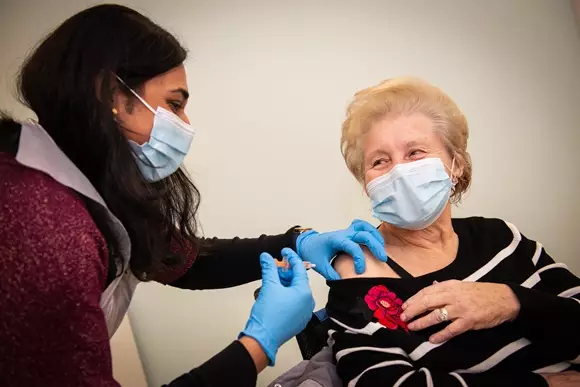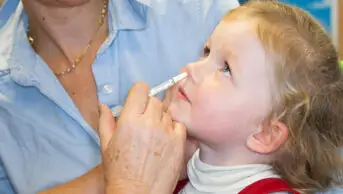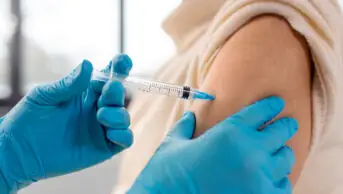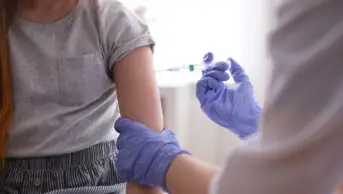
Boots
Open access article
The Royal Pharmaceutical Society has made this article free to access in order to help healthcare professionals stay informed about an issue of national importance.
To learn more about coronavirus, please visit: https://www.rpharms.com/resources/pharmacy-guides/wuhan-novel-coronavirus
The biggest vaccination programme in the UK’s history began on 8 December 2020 when Margaret Keenan, who was then aged 90 years, was vaccinated at University Hospital, Coventry, with a COVID-19 vaccine manufactured and developed by Pfizer and BioNTech.
By 27 January 2021, more than six million people had received a vaccination, with nearly 450,000 people being given two doses of a vaccine. But how is the programme arranged, and how are pharmacies and the pharmacy profession getting involved?
Which vaccines have been authorised?
On 2 December 2020, the Pfizer/BioNTech COVID-19 became the first COVID-19 vaccine that could be administered in the UK when it was authorised by the Medicines and Healthcare products Regulatory Agency (MHRA).
Data from BioNTech and Pfizer suggest that it is more than 90% effective in preventing COVID-19 when two doses are given.
The MHRA has since authorised a vaccine manufactured by the University of Oxford and AstraZeneca, which also requires two doses, but can be kept at regular refrigeration temperatures.
Another vaccine, developed by Moderna, has also been approved, but supplies will not be available in the UK until spring 2021.
Other vaccines, such as those manufactured by Novavax and Janssen, are currently in phase III clinical trials. For more information on the COVID-19 vaccine candidates and trials, read our list of ten things pharmacists should know about COVID-19 vaccines.
Who is getting the vaccine first?
The Joint Committee for Vaccination and Immunisation (JCVI), which advises UK health departments on immunisation, updated its prioritisation of patients to receive the vaccine on 2 December 2020.
The first four cohorts to be vaccinated are: residents in a care home for older adults and their carers; all those aged 80 years and over, and frontline health and social care workers; people aged 75 years and over; and everyone aged 70 years and over, and clinically extremely vulnerable individuals.
The Westminster government has set a target for everyone in these four categories, around 14 million people, to have been offered a vaccination by 15 February 2021.
Following an announcement that a new, more transmissible strain of COVID-19 was circulating in the UK, the JCVI advised prioritising the first of the planned two vaccine doses, with the second dose being administered to patients up to 12 weeks later.
How is the vaccination programme organised?
In England, COVID-19 vaccines have been delivered from 206 hospital hubs, 1,200 local vaccination service sites — run by a mixture of primary care networks and community pharmacies — and 50 vaccination centres located in large-scale venues, such as football stadiums.
As of 28 January 2021, 117 community pharmacies are administering vaccines across the country, with around 200 expected to join the programme. Patients are contacted through a national call and recall programme. Once patients are notified by the service, they will be able to book an appointment at the PCN-led vaccination centre affiliated with their registered GP, or use the National Booking Service to be vaccinated by another provider, such as a community pharmacy or mass vaccination clinic. Pharmacists will be responsible for uploading clinic times to the system so that bookings can be made.
On 18 December 2020, the Welsh government laid legislation creating the Primary Care COVID-19 Immunisation Scheme, which will enable health boards to commission community pharmacies to provide the AstraZeneca vaccine. Vaughan Gething, minister for health and social services, said this vaccine would be available from patients’ “local GP practice and pharmacy”.
The Welsh government has developed the Welsh Immunisation System, which will create appointments and automatically schedule second doses, send appointment letters and record vaccinations for each COVID-19 vaccine given.
“Those receiving a COVID-19 vaccination will be given a credit card-sized NHS Wales immunisation card which will have the vaccine name, date of immunisation and batch number of each of the doses given handwritten on them,” he said.
Scotland started its vaccination programme on 8 December 2020 by “vaccinating first the vaccinators themselves”.
How are pharmacists involved?
In England, as part of an enhanced service specification, GP practices running the PCN sites can subcontract COVID-19 vaccination work to community pharmacies. Chief pharmacists at clinical commissioning groups are expected to support GPs at PCN-designated sites by ensuring the safe handling and use of the vaccines.
Pharmacists can also apply for an immuniser or supervisor role in the COVID-19 vaccination programme through NHS Professionals. So far, more than 700 pharmacy staff members have applied to these roles.
Hospital pharmacists working in vaccination centres are primarily in charge of overseeing that the complex handling requirements of the COVID-19 vaccine are met “to ensure patient safety”.
Guidance published by NHS England noted that pharmacy input “must be considered in the mass vaccination sites to maintain product integrity of the vaccine”, as the workforce mix of healthcare professionals and new recruits means “good pharmaceutical oversight is essential to ensure patient safety”.
In Scotland, first minister Nicola Sturgeon said vaccine deployment centres would be “overseen by pharmacy staff”. Health minister Jeane Freeman added that the Scottish government is in talks with pharmacy contractors “in order to secure what I would describe as their sessional time — their time in local vaccination centres”.
Can the vaccine be administered in a community pharmacy?
Pharmacy contractors were asked to apply to NHS England for status as a designated COVID-19 vaccination site by 6 December 2020, as long as the pharmacy site met a certain set of requirements. NHS England said a “limited number” of community pharmacy sites would be commissioned to administer vaccines under a local enhanced service.
The requirements that pharmacies need to meet to be chosen as a vaccination site are very stringent. For example, pharmacy-led sites will need to deliver 1,000 vaccines each week and have capacity to store these vaccines in fridges at 2–8°C all at once.
NHS England said in its letter that it did “not expect the majority of contractors’ sites will be able to meet these requirements”. And that proved to be the case.
Community pharmacy trade bodies called for a greater role for the sector in the vaccination programme, following the approval of the Oxford University/AstraZeneca vaccine. The Pharmaceutical Services Negotiating Committee and other trade bodies entered into talks with the government on 11 January 2021 to discuss “using more community pharmacies” in the national COVID-19 vaccination effort, arguing that community pharmacies could vaccinate “up to one million people each week”.
In England, six community pharmacies began vaccinating patients on 14 January 2021, and a further 65 community pharmacy-led sites started administering vaccinations from 21 January 2021. An additional 46 began administering vaccines on 28 January 2021. Malcolm Harrison, chief executive of the Company Chemists’ Association, which represents the large multiples, said his organisation had submitted proposals to NHS England on how to increase the use of community pharmacy in the vaccination drive.
The Scottish government has not said whether there is scope for the vaccine to be delivered in community pharmacies. However, Community Pharmacy Scotland has said one health board is currently looking into using community pharmacies to provide “a complementary [vaccination] service to the main programme”, although the agreement had yet to be finalised.
Community Pharmacy Wales has urged the Welsh government to “speed up” the use of community pharmacies’ involvement in the Welsh primary care scheme for delivering the vaccine, arguing that only one health board, Hywel Dda, is taking expressions of interest. A pharmacy in the Betsi Cadwaladr health board area began piloting vaccine delivery on 15 January 2021.
How much will community pharmacies be paid for participating in the delivery programme?
Pharmacies in England, Wales and Scotland will be paid £12.58 per vaccination on the completion of the final dose. So, for a vaccine with two doses, pharmacies will be paid £25.16.
Under the Primary Care COVID-19 Immunisation Scheme in Wales, pharmacies will receive an additional £400 per 1,000 vaccines administered.
In England, GP practices operating under PCN-led sites have been asked to put in place a COVID-19 Enhanced Service Vaccination Collaboration Agreement, which will set out how they will work with providers in the PCN to administer the vaccines. This agreement will need to cover “financial arrangements relating to other healthcare providers (such as community pharmacies) outside its PCN grouping involved in local delivery” of the vaccine. The agreement will also include subcontracting arrangements.
The NHS has established the COVID-19 Vaccination Channel (CVC), which is a dedicated supply chain to provide equipment and consumables to vaccination administration sites. The CVC will supply goods from a specified list, including aprons, eye protection, face masks and gloves. Cool box refrigeration and clinical waste bags, for example, are also listed for supply through the CVC.
Who else will be administering COVID-19 vaccines, beside GPs and pharmacists?
In October 2020, the government enacted changes to the Human Medicines Regulations, which expanded the workforce able to administer a COVID-19 vaccine. Under the amended legislation, each of the four UK nations will draw up protocols specifying eligibility for vaccine administration, including “where appropriate, requirements for the supervision of an additional experienced vaccinator”.
The NHS is setting up a team of COVID-19 vaccinators through NHS Professionals, which is recruiting registered healthcare professionals to administer vaccines and to offer clinical supervision. According to its website, non-healthcare professionals can also apply to be immunisers, as long as they have at least two A-levels. First aid training is “desirable” for this role.
In Scotland, the government is looking to recruit 2,000 vaccinators and support staff by the end of January 2021, including general practitioners, pharmacists, dentists and optometrists.
Health boards and trusts in Wales have developed their own workforce plans for vaccination that identify training and recruitment needs. Health boards and trusts are using the existing workforce to fill these roles first, with additional recruitment ongoing.
What about pharmacy technicians?
Under the national protocol for England, pharmacy technicians can prepare and administer the vaccine. An NHS England document summarising the protocol says it allows “those who are registered healthcare professionals who cannot operate under a PGD [patient group direction], and those who are not registered healthcare professionals, to safely administer a licensed or temporarily authorised COVID-19 or influenza vaccine”.
The Association of Pharmacy Technicians UK said in a position statement that pharmacy technicians “are not included in the national protocol definition of registered healthcare professionals” and, therefore, “cannot undertake clinical assessment or clinically supervise the process of others”.
“Pharmacy technicians can be authorised by name to work under this protocol and do so under the supervision of a registered doctor, nurse or pharmacist.”
How will vaccinators be trained?
Vaccinators will be asked to take the COVID-19 vaccination e-learning course developed by Public Health England (PHE), Health Education England and NHS England & Improvement. Registered healthcare professionals and some unregistered and non-healthcare vaccinators will also have to undertake additional e-learning on immunisation.
All unregistered and non-healthcare vaccinators will also be given face-to-face and practical training, according to PHE guidance, before being signed off as competent by a registered healthcare professional with experience in immunisation, using the COVID-19 vaccinator competency assessment tool.
Public Health Scotland and NHS Education for Scotland have also developed educational resources to support the COVID-19 vaccination programme in Scotland, with vaccinators of all experience levels expected to review “core knowledge” resources and complete relevant proficiency documents with an experienced supervisor. Healthcare support workers new to vaccination practice will also have to complete a 12-unit e-learning course and undertake supervised practice.
Essential resources
Letter to community pharmacy calling for applications to lead vaccination centres
Designation process for community pharmacy-led vaccination centres
Guidance for trusts on COVID-19 vaccination deployment strategy and operational readiness
Guidance on the set up of COVID-19 vaccination centres
Guidance on the equipment and consumables to be given to vaccination centres free of charge
NHS Professionals website to apply for individual job in vaccination centre
PHE guidance on the COVID-19 vaccine
Information for Healthcare Professionals on Pfizer/BioNTech COVID-19 vaccine
Timeline
9 November 2020 — NHS England writes to GPs asking them to nominate one site from each primary care networks (PCN) from which COVID-19 vaccines will be delivered
20 November — NHS England to decide on designated PCN-led vaccination sites
27 November — NHS England writes to pharmacies asking for applications to be come a COVID-19 vaccination site, with a deadline of 6 December
1 December — NHS England published enhanced service specification for GPs
2 December — Medicines and Healthcare products Regulatory Agency authorises use of COVID-19 vaccine manufactured by Pfizer and BioNTech
8 December — First administration of the Pfizer/BioNTech vaccine
18 December — NHS England due to tell pharmacy contractors whether their applications for site designation have been successful
11 January 2021 — Vaccination sites led by community pharmacies begin administering COVID-19 vaccines to patients
Key quotes
Health secretary Matt Hancock in a statement to the House of Commons about the Pfizer/BioNTech vaccine: “Mr Speaker, over the next few months we will see vaccines delivered in three different ways. First, we will begin vaccination in hospital hubs. Second, we will deploy through local community services, including GPs and in due course pharmacies too. And, third, we will stand up vaccination centres in conference centres and sports venues to vaccinate large numbers of people as more vaccines come on stream.”
Leyla Hannbeck, chief executive of the Association of Independent Multiple Pharmacies: “A small number of our members have been progressing applications to run very well-thought-through vaccination centres — the process has unfortunately proven to be not very community pharmacy-friendly and has discouraged more of our members from making an application.”
Alastair Buxton, director of NHS Services at the Pharmaceutical Services Negotiating Committee: “Site designation will only be attainable for a small number of pharmacies. Contractors will need to carefully consider whether they may be able to participate as a designated site, or if they would be better placed assisting in another way.”
Sandra Gidley, president of the Royal Pharmaceutical Society: “Pharmacists have the expertise to play a crucial role in administering COVID-19 vaccinations, having delivered on many effective flu vaccination programmes in the past. We need assurances from the NHS and governments that the programme will not disrupt our already stretched workforce, but make way for greater collaboration between health professionals and minimise the impact on routine practice.”


